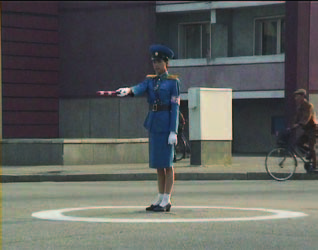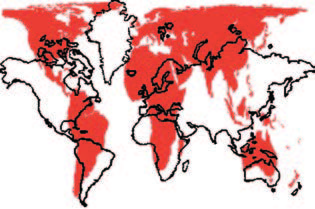“I ‘m almost 100 years old and there has never been a winka here, only Mapuches!”
The rhythm is aggressive, dynamic. The voice, accusatory. The lyrics, “Everything winka touches, he destroys it / All throughout our history always the same thing / Steals and makes war, kills like poisoned water…” This is Mapuche hip hop, and it‘s the voice of the one and a half million Mapuches who live in Chile.
The struggle against the invaders
Image 1: An old Mapuche woman. Her face is covered with wrinkles, but she speaks with fervor. “We must live here, this land is of the Mapuche, not of the winka! I’m almost 100 years old and there has never been a winka here, only Mapuches, raised barefoot on the land, like my grandfather, like my grandma! We were real Mapuche, go away winka, go away!”
Winka means invader. There were many of them in Mapuche history. First, the Inca Empire, which was adjacent to the Mapuche territory. Then, in 1541, came the brutal colonists from Spain. Finally, the Chileans and Argentineans. After declaring independence from Spain in 1810, these two states began to exhibit the same brutality in their conquest of the Mapuche land as that employed by the Spanish before them.
As a consequence, today the Mapuche Nation, situated in the south of Chile and Argentina on both sides of Andes, occupies only five percent of the ancestral territory. The Chilean government is constantly neglecting the Mapuche people’s right to their ancestral land, which has legally been taken into private ownership.
“They have surrounded us,” says an old Mapuche farmer with a cloth band tied around his forehead. “I have three hectares and one hectare is for my son. But I have many children. How will I provide for them?” Jose Paillal, Mapuche Leader in Santiago, explains the Chilean government’s policy: “They are fostering the creation of a Mapuche identity that is disinterested of the land. They tell us that it is possible to be Mapuche in the city.”
The Chilean constitution does not mention the existence of the Mapuche people. Therefore, it does not prescribe that the educational system ought to distinguish between Mapuches and those Chileans of European origin. The government stands for cultural uniformity, which contributes to the difficulties people have maintaining true Mapuche identity. Due to these policies, the Mapuche culture – thus, also the Mapuche people – are in constant danger of disappearing.
Maintaining cultural identity
Image 2: Mapuche children stand in front of a schoolhouse with their teacher. The teacher prompts, “In spite of being Mapuche, we are part of the territory called what?”
“Chile!” the children call out in unison.
“Correct. And this is our flag,” the teacher points to the Chilean flag fluttering in the wind.
The children begin to sing the national anthem: “Chile your sky is pure blue, streaked by pure breezes, your country is embroidered with flowers, like a merry copy of Eden…”
“Nowadays our children go to school,” says Ricardo Melinir, chief of the Mapuche Quinquen community. “But we are also rescuing our culture, our identity.” He lists the most important values for the Mapuche: “The knowledge of the ancestors is our source of wealth and richness. Grandfathers teach grandchildren. Sometimes they talk until dawn and they never get tired. The books talk about the history of the winkas, which is not in favor of the Mapuche.”
Mapuches are known for their worship of Nature. “We are deeply connected to Nature”, explains Ricardo Melinir. “We can understand it through our dreams. We know what the winter or summer will be like, whether there will be harsh times or a good harvest.”
Whenever I read or hear about a small nation, which is oppressed by a stronger state, I ask myself “Why?” Actually, the answer seems to be very simple: It‘s the weaker state that‘s more easily conquered, plundered, and robbed. These have been the ones vulnerable to abuses throughout the centuries. But why do the stronger nations so rarely accept the smaller ones without fighting wars? It’s probably a question of human nature. Greed, hostility, and the inability to understand other people – these features are common in everyday life. It‘s when they are adopted by the state that they become far more dangerous.
Image 3: An old Mapuche man sings a slow song, fraught with feeling. His words: “Here I am with my brothers, together we support each other. But if something goes wrong, what shall we do…?”











